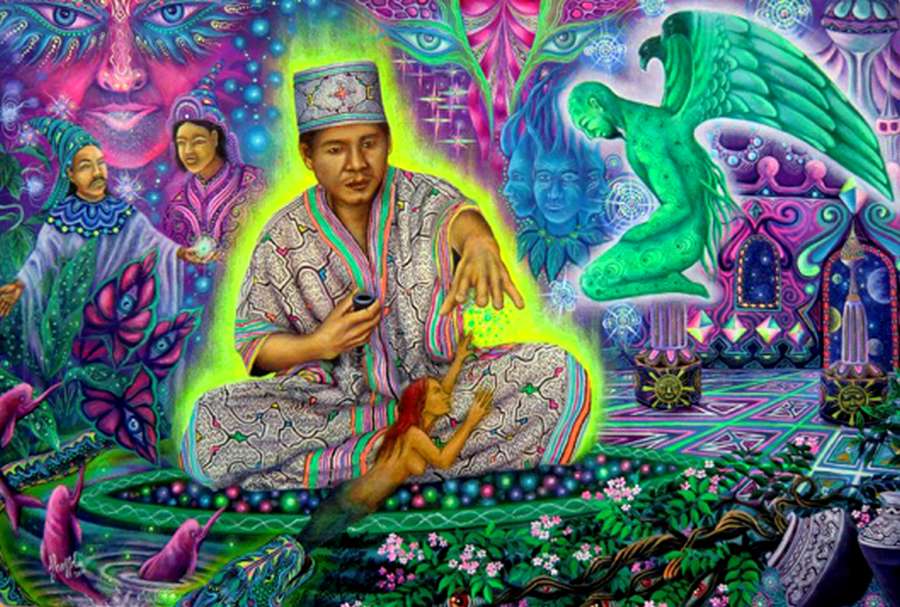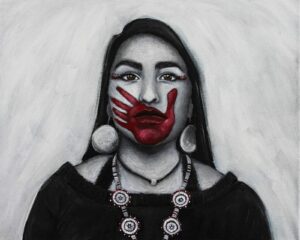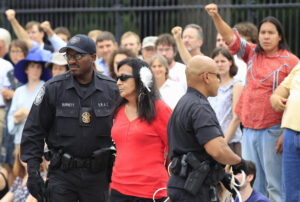How the Psychedelic Movement Disregards Indigenous Knowledge
Five questions for Indigenous protester Kuthoomi Castro. Image: Pablo Amaringo
Image: Pablo Amaringo
Kuthoomi Castro is an Indigenous Mestizos Kichwa, who was born and raised in a Catholic tradition in Ecuador. Castro uses they/them pronouns and is Two Spirits, a term that can include nonbinary and third gender Indigenous people. When Castro was 12 years old, Catholicism stopped making sense and they began seeking out Indigenous traditions, largely under the apprenticeship of medicine elders of the Kuyaloma community of Napo-Ecuador. Castro went on to become an Ayahuasquero, someone who is entrusted with plant medicine traditions and conducts ayahuasca ceremonies. Castro now works as a private clinical mental health counselor and lives in Boulder, Colorado but travels back to Ecuador once or twice a year.
In June, the Multidisciplinary Association for Psychedelic Studies (MAPS) held what the organization billed as the “largest psychedelic conference in history” called Psychedelic Science 2023 in Denver. Over five days, thousands of attendees went to panels, workshops, and other events. On the last day of the conference, during MAPS founder Rick Doblin’s closing remarks, Castro and several other protestors climbed onto the stage and took over the podium and the microphone. The protestors spoke about the ways they felt the conference dismissed Indigenous voices and the threats to Indigenous peoples they see from the broader psychedelic movement. The Microdose spoke with Castro about what happened and why.
What are some of the trends you see in the modern psychedelic movement that concern you?
I’ve been doing this social justice work for a long time and one of the things that I’ve seen is the tendency is to homogenize things, to make things universal. They package our Indigenous traditions and plant medicines and they want to sell it for everybody. And as we know through history, that loses the essence. A lot of these people that are just learning to step into the medicine ways are not allowing themselves to be guided. A lot of them come with a lot of arrogance.
A lot of people are coming to our communities and bringing a lot of money that corrupts our people.
They want to make a rule or regulation and everybody has to do it that way. That’s a Western approach that is not going to work. And if it works it is only going to be an external thing that is going to cause harm, and is going to disempower Indigenous people. So that’s another layer that we’re seeing happening already. We’re being disempowered, we’re not being centralized. Medicines are being taken away from us. We’ll continue doing what we do. We’re still here, we’re not going to be erased.
Can you give some specific examples of how and where you see that perspective manifesting in the U.S. and elsewhere?
There were two bills that the state of Colorado was pushing through on the decriminalization and legalization of natural medicine and psychedelics. None of them were good. Money got involved, people started pushing things, and things went so quickly that within a year, they pushed the whole agenda. (Editor’s note: In November 2022, Colorado voters passed the Natural Medicine Health Act, a citizen-initiated measure that made plant and fungi-derived psychedelics state-legal for people 21 years of age and older.) So what they did with the legalization, they opened it up so that the medicines moved into the system. It’s an illusion that the legalization has freed the medicine and that the decriminalization has freed the medicine.
The Colorado Department of Regulatory Agencies has taken over and they’re going to be regulating how these medicines are going to be served and provided. So it’s a delusion that they have created liberation and accessibility. This is probably going to expand to other states and federally, or at least that’s what they’re working toward.
There’s also ayahuasca tourism or medicine tourism in the Amazon. A lot of people are coming to our communities and bringing a lot of money that corrupts our people. People are in need because that’s what the system does. It creates the need and then it sends the saviors. White saviors say they are going to help the community but they actually created a need through oppression. So we see that cycle happening with over harvesting of the medicine, people disrespecting elders, people coming to communities and treating the people like slaves.
Some people say that we are seeing a resurgence or renaissance of psychedelics. What do you think about that language?
It’s a lie. The renaissance that they’re talking about, it’s about plant medicine within the Western hemisphere. Indigenous people have always been in touch with our medicines. Maybe we lost it a little bit in the cities, but down in the Amazon, down in the countryside, down in the reservations, we have medicines and we’ve been protecting them. But it was lost within the cities and the colonial environment. It became illegal.
There were traumas coming out, people screaming, people defending, and so many things.
So it’s not a renaissance for us as Indigenous people. It’s a renaissance only for Western people. This movement began with us when we opened our medicines. People started coming back home, coming back to our cultures, coming back to our roots.
What was your experience like at the Psychedelic Science 2023 conference?
It was very, very intense. I went to some of the Indigenous presentations, which were beautiful. But some of the questions that people asked were so colonial. It hurts me to see when we’re tokenized, you know, like they want us here, they want us to give our voices, but they don’t like what we say. They’re only happy when we’re in alignment with what the normative narrative wants us to say. And the moment we start speaking up, they don’t like us. So you see dismissals happening, taking microphones away, limiting our speaking time.
They still want to run the show. And it’s very clear why. If you stop to talk, you lose money. You lose privilege, and you’re not in the center anymore. They’re very used to being the center.
Can you walk us through your protest at the MAPS conference? Why did you want to get on stage and speak and what message were you hoping to get across?
My intention was never to speak. But my ancestors, my voice, just spoke. I was definitely very triggered. I’ve never spoken to such an intensity of people. There were traumas coming out, people screaming, people defending, and so many things. But I think I did a good job of delivering what needed to be said, which is the message that I bring from the South, my personal understanding from speaking with my elders and my community. I’m not against white people learning about plant medicine, but they need to take the time and have humility. Nobody owns the land. Nobody owns the medicine. In our communities, it’s not about owning the medicine. It’s about protecting it and standing strong. But they want to own it.
I was shaking and trembling and emotional. And I also think that was beautiful for people to see. You know, this is not easy. This is really, really hard for us. We didn’t know it was going to happen. We didn’t plan it at all. But it was a very clear moment where we saw this massive conference and so many people were in the la-la world thinking how amazing it was. But we don’t want people to go only with that narrative. You also have to see the other narratives. So that’s why we went for it. We didn’t plan it. It just happened how it happened.
Your support matters…Independent journalism is under threat and overshadowed by heavily funded mainstream media.
You can help level the playing field. Become a member.
Your tax-deductible contribution keeps us digging beneath the headlines to give you thought-provoking, investigative reporting and analysis that unearths what's really happening- without compromise.
Give today to support our courageous, independent journalists.







You need to be a supporter to comment.
There are currently no responses to this article.
Be the first to respond.